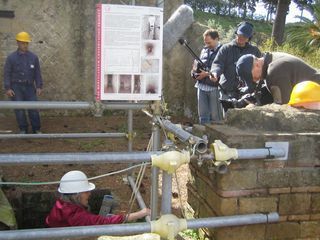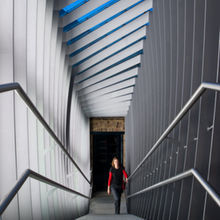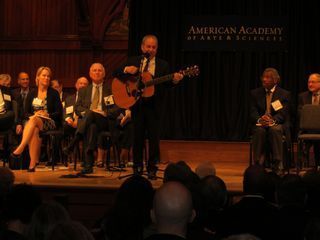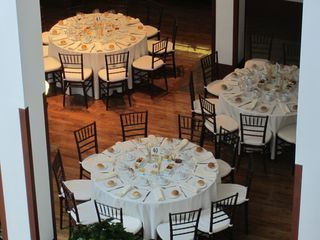Mary Beard's Blog, page 62
October 5, 2011
In My Back Yard
The University of Cambridge is just applying for permission to develop "North West" Cambridge. For those of you that know the place, that's between the Huntingdon Road, Madingley Road and the M11. It is currently more or less open land; the plan is that is should be developed to include 3000 dwellings, 2000 student bedspaces, 100,000 square metres of employment space (of which 60,000 will be academic), 5300 square metres of retail (including an up to 2000 square metre supermarket), 6500 square metres of senior living . . . plus sports facilities, school, nurseries, hotel and the rest.
It is just a few hundred metres up the road from my house.
I can see why people are objecting. It's a lot of open space to get gobbled up in one go (especially when Addenbrookes is gobbling up vast tranches on the other side of town). But the university makes a strong case for needing more space and housing, and there is a point in having a coherent development rather than endless piecemeal fill-ins in the centre of town.
Sure, it will be a bit different for me when there are getting on for 10,000 more people living just up the road. But then, thinking selfishly, there could be some advantages too. A supermarket would be very useful (please make it a Waitrose), and public transport from here to the station might be given a boost. And who knows when I might be interested in that senior living?
But what I really want to know is what the place will look like. If it is going to be well-designed, distinguished architecture, with an eye on the future (the Edinburgh New Town or the Isokon of the twenty-fifth century), something the university will one day be as proud of as (say) King's College Chapel, then I am hugely in favour. If it is going to be undistinguished formula-build done on the cheap, and oozing with false economies (more like Milton Keynes than Edinburgh), then I might almost find myself coming down on the side of the opponents.
The truth is that the university has a mixed record in this department. Some of the best modern architecture in the country is on the Sidgwick Site, a veritable gallery of stunning buildings (click onto track 15 here) -- the Classics Faculty sadly not amongst them. But there is plenty of undistinguished stuff and plain bad taste too (just remember the lift in the Old Schools). So which is this going to be?
The trouble is: it's very hard to find out about that.
At this (outline) stage in the planning process, you don't have to submit detailed designs; that all comes later. So in this application there are reams and reams of downloadable pages about roads, sustainability, even public art, but no more detail on the individual bits of design than a few computerised drawings with "blocked out" schematic building blocks (a bit like Monopoly houses).. at least, I hope they are schematic. Apart from that, there are a load of PR-style platitudes about the design philosophy:
" a high-level of design quality for all parts of the community to create accessible developments and neighbourhoods with their own character and legibility"
"the diverse buildings within the local centre are brought together by a unique public realm"
"without imposing a prescriptive pattern language at this stage, architectural details will be developed to respond positively to wind and rain throughout"
"fundamental to the success of the Proposed Development is the creation of a strong sense of place as a natural extension of, one which feels like a part of the historic city"
Not much the wiser (or reassured), I had a look at the website of the companies and designers involved. The external project coordinator is a multi-national called AECOM, with some vast international projects  under their belt like the Mary Catherine Bunting Medical Center in Maryland (on the right), but they're not exactly architects so far as I could see. Certainly, the prizes listed on their website were for being one of the world's most ethical companies, or best workplaces -- not for design.
under their belt like the Mary Catherine Bunting Medical Center in Maryland (on the right), but they're not exactly architects so far as I could see. Certainly, the prizes listed on their website were for being one of the world's most ethical companies, or best workplaces -- not for design.
There are also two architectural practices named in the supporting data in the application. First, MacCreanor Lavington.  They just recently did a really great residential development in Cambridge (Accordia) on the left, which seems a good omen. I wasn't quite so keen on their new H10 hotel in Waterloo. But overall pretty encouraging. Second, Wilkinson Eyre.
They just recently did a really great residential development in Cambridge (Accordia) on the left, which seems a good omen. I wasn't quite so keen on their new H10 hotel in Waterloo. But overall pretty encouraging. Second, Wilkinson Eyre.  From what I could find, they seemed to me a tiny bit dodgier. I've really enjoyed their 'bridge' in the VandA (at the top) --and they've got a great line in bridges, in fact. But I was far less sure about their Ashcroft Business School or the Anglia William Harvey Building (right).
From what I could find, they seemed to me a tiny bit dodgier. I've really enjoyed their 'bridge' in the VandA (at the top) --and they've got a great line in bridges, in fact. But I was far less sure about their Ashcroft Business School or the Anglia William Harvey Building (right).
So I suppose all we can do is hope that the university lives up to the high standards it sometimes has, and sees this as a chance to leave a wonderful twenty-first century mark and isn't afraid to pay for something good (and good doesn't always cost that much more than bad).
If not, we'll find that we have a green, sustainable, ethically sound, community based development, complete with its proper complement of public art -- just looking dreadful. 'Pity it was built during the great recession,' they'll say centuries hence.
October 2, 2011
At the American Academy of Arts and Sciences -- with Paul Simon and friends
The Induction event at the American Academy in Boston yesterday rather exceeded hopes and expectations. I'd caught the red-eye from San Francisco (why are long US domestic flights so punitive?... a rock hard seat and a scrap of material supposed to be a "blanket", but only covering half a normal sized body). So by the time I got to Boston at 7.50 am I was in no state to start the day, and was beginning to dread it.
I decided, in the interests of kindness to self, to skip the first part of the induction program -- and fetched up at the hotel in Harvard, where my son (the escort for the occasion, thank you Raph) had already bedded down, for a couple of hours kip. Then things (and energy) began to look up.
We turned up at the Academy's HQ mid-morning, were recognised by our accents and given our badges... I then went to a bit of the briefing seminars, while the son amused himself analysing the acceptance  letters for membership that were on display, all the way back to George Washington. Then lunch (with plenty of wines and some artfully themed cookies, as you can see on the right.. tables after the jump), and on to the Sanders theater for the induction itself.
letters for membership that were on display, all the way back to George Washington. Then lunch (with plenty of wines and some artfully themed cookies, as you can see on the right.. tables after the jump), and on to the Sanders theater for the induction itself.
There were well over 100 new members present and being inducted (including a few 'Foreign Honoraries' like me). And the whole thing was brilliantly choreographed (including, bizarrely, some Gaelic bag-pipers from the Boston police department, piping the platform party in). We were divided into five classes (Maths and Physical Sciences, Biological Sciences, Social Sciences, Humanities and Arts (that was me), and Public Affairs). For each class, there was an introduction and a speech by one new honorand, and then all the rest of us went up and shook the hands of the chair and president, and signed the book.In Class 3 (Social Sciences), the new boy's/girl's speech was given by Adam Roberts (the President of the British Academy), and it was -- even I am biased -- a little masterpiece: it captured politesse, history (via J. Bentham), some uncomfortable lessons about modern geo-politics and salutary reflections on the current state of the Social Sciences and Humanities on both sides of the Atlantic.
But choreographed as it was, there was still the possibility of some personal choice. On the front row of the platform party was Paul Simon (new member in my Class). The first group to go up to sign stalwartly ignored him and went to shake the hands of the Chair and Pres. Then a couple of Biological Scientists decided to shake Simon's hand, and then go on to the Officers of the Academy. After that, it was a question of "Simon or not?". Some went directly for him, shook the hand and moved to the Officers. Others walked determinedly by.
So what did I do? Well, I felt that Simon might have by this stage have been feeling a bit bored/embarrassed by the parade; so I decided not to shake the sainted hand, but I gave him a big smile as I walked past. Hope he noticed.
Overall, it felt both like - and very unlike -- the British Academy (and I imagine the Royal Society). Like..? Well, despite what I imagine are heroic efforts, the whole gathering seemed pretty white, be-suited and male (and middle aged, of course.. but that's the point of the Academy; it isn't for teenaged celebs). I think there were a few more women in the hard sciences category than we have in the Royal Society, but not hugely more; likewise with non-whites (more but not that many).
But the real difference was what happened at the end. Paul Simon didn't give a speech, he played a song ('American Tune' -- a nice choice). All those suited men and super-successful were, of course, 60s and 70s children; there couldn't have been more than a handful in the room, who hadn't grown up to Paul Simon's music, and it was more than a little bit moving to have him play for us and with us. It was "our generation".
Now I haven't yet seen many meetings of the British Academy (and the BA doesn't have a category for performing artists etc), but nothing like that has ever happened. I now think I have a bit of a mission. To get some music into BA events... and not just the occasional operatic aria, but the music that we greybeards grew up with and still hum to, by musicians who grew up and grew old with us.
But who should it be? Paul Simon and his acoustic guitar was perfect (could we entice him over?). Nationally, what could the British Academy lay on? Paul McCartney, Elton John, Rod Stewart, Cat Stevens (if he would ever revisit "Wild World", which he probably isn't now allowed to perform), Jarvis Cocker . . . or if we counted the commonwealth, what about Leonard Cohen? He was also elected to the American Academy this year, but didn't come to the Induction; but I would LOVE to hear "Hallelujah" in Carlton House Terrace (great location, by the way).
So if any one of these stars ever gets to read this blog, and fancies a pro bono London gig, do get in touch and we'll see what we can do. Adam Roberts seemed to really enjoy the Paul Simon, so I am guardedly optimistic that we could pull it off.
Just to finish the story. The son and I ended the evening with Academy Member and Classicist David Konstan and Pura Hernandez, and Jeff Henderson (another inductee.. and brilliant editor of the Loebs), and Pat Johnson. Thank you everyone. No need to tell me that I have been a beneficiary of the democratic pluralism of the USA.
Here are some pics of the final dinner...good time being had by all.
September 30, 2011
One night stands

Lecture tours in the USA may not be quite like the proverbial Simon and Garfunkel "tour of one-night stands" -- singing with your band out of a suitcase -- but it's not quite as different as you might think. This week, I've been in Texas and California lecturing and seminaring: to be precise, two graduate seminar papers and a public lecture at the University of Texas (at Austin -- rather nice place, even if currently more than 100 degrees fahrenheit), then a public lecture at Stanford, followed this afternoon by responding to a paper at a conference on travel and travel literature.
This is of course what the job's about and it is huge fun. I have met loads of new people, talked to heaps of clever graduate students, reconnected with old mates and picked up all kinds of bibliography and ideas. Last night, for example, I had a really useful 'frank exchange of views' on Roman portraits with Chris Hallett who had come across to my lecture in Stanford from Berkeley with some of his students -- which would never have happened through email.
So it's all very worthwhile -- but also dead knackering.
I can't help thinking that Simon and Garfunkel didn't do their tour of one night stands in the week just before their term started, so they weren't living the kind of electronic double life that I am. That is to say, taking advantage of the jet lag and getting up at a spritely 5.00 am, I spend the first five hours of the day doing 'student admin' etc, electronically. This morning I wrote three references for applications for research fellowships, checked out the supervision arrangements for one of the courses my Newnham students will be taking this term, got in touch with some of the graduates who will be coming to my MPhil seminar, caught up with a PhD student and arranged to see her next week, fixed up some textual criticism teaching for my third year girl who is taking that option (and I need it fixed by Monday), read through the 'exam entry' blurb sent around by the college office, emailed a supervisor who will I hope give some special language teaching to a student changing into Classics from Archaeology, looked over a draft of the bibliography I shall be needing for my Roman history lectures, settled on the date of a student party with the other senior member concerned. . . as well as tracking down the whereabouts of a Roman painting that we are going to want to film for the new BBC series I'm doing (thank you Googlebooks).
May be it was in fact better in the old days before email, when being away meant BEING AWAY. Or maybe then, you just didn't go away in the week before term.
Tonight -- just to make sure I am really exhausted -- I am going on the red-eye flight to Boston, to go to the inauguration celebrations at the American Academy of Arts and Sciences. Funnily enough, Paul Simon is -- like me one of the new Fellows this year and I am kind of hoping that he shows up too.
His days of one night stands are long over, though. Unlike mine.
September 26, 2011
AD vs CE
Let's get this quite straight: the BBC has not banned the use of BC and AD, in favour of the religiously neutral BCE and CE.Though that is what a quick glance at a few of this week's newspapers would suggest.
"The Corporation has replaced the familiar Anno Domini (the year of Our Lord) and Before Christ with the obscure terms Common Era and Before Common Era" intoned the Daily Mail, while giving a hearty pat on the back to the almost unknown medieval monk, Dionysius Exiguus ("Little Dennis") who invented the BC/AD system. If some people find the BCE/CE terminology a bit obscure, that is nothing compared with the obscurity of Dionysius Exiguus -- who has been enjoying a totally unexpected 5 minutes of fame.
No, the BBC hasn't banned BC and AD. So far as I can see, various departments within the organisation have advised that BCE and CE may sometimes be more appropriate for a multi-cultural/multi-faith audience. It has done not much more than draw the issue to the attention of its editorial staff.
I'm actually suprised that it needed much drawing. In ny world CE and BCE have been around for years, and often used instead of BC and AD. I would say that some 50% of academic articles in Ancient History now use CE and BCE, more in the USA. And it hasn't brought the Christian church down -- and certainly not in America.
The issues here are both clear AND tricky. First BC and AD are certainly totally embedded in a Christian world view, though that may be conveniently concealed beneath the standard abbreviations. In fact, Dionysius did not invent the shorthand "BC" and "AD" in the shortened form, he invented the whole principle of arranging time around the birth of Jesus Christ.
Imagine if every newsreader spelled it out in full "England's World cup victory, In the year of our Lord 1966 . . ." or whatever. Then there really would be howls of protest, some of them from the very same people who are now objecting to the rumoured demise of BC and AD.
There is no doubt that this is a Christian system. The problem is that the CE/BCE replacement doesn't exactly un-Christianise it. Dionysius was super successful to the extent that in most circumstances in the west it is now impossible to imagine unpicking the Christian calendar. (Geologists have done it up to a point with BP, "Before Present" -- because with the time periods they are dealing with the line drawn 2000 years ago doesnt matter very much.) So you might say "Why Bother?"... wouldn't it just be better to make people a bit more aware of the Christian framework built into out calendar?
My particular problem with CE and BCE is rather different though. It's an oral one. If you lecture, then BC and AD are great, as it is so easy for your audience to "hear" the difference. If you use CE and BCE when you are speaking you are always having to over-enunciate to make sure they get the point and the difference. And even then, many a hapless undergraduate fails to register, and gets Nero before Julius Caesar.
So if there is a reason that the BBC should generally stick to the old usage, for me it is that it is easier to "hear". Which is quite different from the BBC bashing, "I dont pay my licence fee to have the Lefty BBC undermine Christianity" kind of drivel that has come flooding out! Try Boris Johnson missing the point here.
September 23, 2011
The advantages of being at the end of a camera

I hope my last post didn't sound too down on the whole filming process. It is really hard work (that was the point) but it is also huge fun, or a large part of it is . . . right down to thinking about how you get your ideas over to a big audience that you can't see, and who are mostly sitting in their living rooms watching TV.
I remember that when I did "Pompeii" (that's the picture at the top) I said to the people making it, 'Why couldn't one just make a TV programme like a radio programme, like (say) "In Our Time". Why do we need to go up Vesuvius and jump in and out of boats around the Bay of Naples, when we are talking about everyday life in Pompeii?" Their reply was spot on, I think. "Most people listen to the radio while they are doing something else, whether driving, cooking or ironing. You expect them to flash in and out of what you are saying. On the other hand, most people do not much else when they are watching telly. So you HAVE to engage them with some visual variety, else they will switch off."
So that's one really fun challenge: interest people, engage their senses AND get your big point across about the ancient world.
But there are other pleasures...
One of the least honourable is that if you are the thinker-presenter like me, you get nicely looked after. I dont mean that I have been living the life of Riley at the expense of the poor bloody licence payer. Far from it. In fact I spent out my living expenses allowance days ago... and NOT on extravagant restaurants or fine wine, just the basics. I mean, that while everyone else humps vast amount of equipment about, I am definitely not allowed to. As soon as I pick up a tripod to carry it into the hotel, it is taken from me. (The truth I suspect is that I am not insured to carry the tripod... and if I drop it, that's expensive. Or if I drop it on my toe and cant hop around from place to place, we're all in trouble.)
So I walk round, unencumbered .. ferried from location to location, not carrying a 15 kilo camera. OK, I do have my little travelling library, and I am allowed to carry that!
But more to the point is the amazing wealth of stuff I get to see this way. Sure, there are some places that just don't want the television cameras in (maybe for Beard-like reasons). But many sites and museums are very keen. So I have seen things on these shoots that I would, I suspect, have taken me a long time to get access to as an academic.
I'm not going to spoil the surprise of what's in this new series. But for the Pompeii programme I was allowed to get up close and personal to some amazing gold jewelry that it would have taken a lifetime of (possibly fruitless) requests to see, as an ordinary professor of classics.
I feel hugely grateful, privileged and (to be honest) lucky, and have really enriched my own academic work this way (I'm giving a seminar in Texas next week on one of the things I've been looking at in Rome). And I'm looking forward to making it a treat for people to watch.
All the same I cant help wondering whether there isn't something a bit topsy turvy here...about who gets to see what, and how easily, in some museums in the world, when a camera isn't around.
September 18, 2011
Filming: the boot on the other foot
When I was curator of the Museum of Classical Archaeology in Cambridge, I used to be terribly ambivalent about film crews wanting to come and use the Museum as a location (it's a great one, by the way). On the one hand, it was wonderful publicity for what we had to offer: a free advert, really. On the other, it was always a total pain in the neck. The crew would turn up with mind-boggling amounts of equipment, they completely disrupted the place for any other visitor -- and they always, just always, went on for longer than they said they would. I tried adding on penalty payments for every 15 minutes over the agreed time, but even that didn't work (though it did bring in more cash).
Now the boot is on the other foot. I'm in Italy filming a documentary series on ancient Rome, and I have become one of those villains I used to find so infuriating -- with all that stuff, getting in everyone's way, and sometimes, I confess, going on too long. A salutory lesson, I guess. I have come to see why it is so hard to be a "well behaved" film crew.
The timing really is extremely tight and disconcertingly unpredictable. Even if you have recce'd every location pretty carefully, you still cant be prepared for everything: the fact that it is a rainy day and very dark and you have to light the place, or a man is digging up the road with a pneumatic drill right outside (and it takes half an hour to persuade him just to take a five minute break), or the airforce has chosen to practice its tricks overhead, or your presenter (that's me) keeps fluffing her lines.
I dont really mean "lines" as there is isn't a written script as such. We know the basic points we want to make at each location, but I do it extempore to camera each time.
You couldn't really do otherwise if you want to make it fresh and good and well-targeted. Actually being in the place suggests new connections and new emphases in what you should be saying. But it's horribly easy to get it wrong first time, or even second time. . . not to say third.
Sometimes that's a matter of tone (too breezy, or not breezy enough). Sometimes it's a question of just getting bogged down in some not very relevant detail -- or realising that you just forgot the wonderful example that you meant to put it. Sometimes you have to take 15 minutes to check a fact that you hadnt realised you needed. I'm travelling with a mini reference library, plus access to JSTOR in the evening -- but thank God for Google on a smartphone during the day, which is great when you have had a sudden crisis of confidence about the exact meaning of a Latin word (brilliant Perseus gives you Lewis and Short online) or suddenly blank on the date of the death of Trajan (no, I dont trust Wiki!)
Making a slip in a lecture is bad enough, but you can always put it right the next time -- you can even make it slightly endearing on the "Homer nods" principle. If you make an error in front of a few million (let's hope) viewers, that's more seriously humiliating, to say the least. (And just think of the number of emails you'd get.)
So it's hardly surprising that you tend to run over time. OK, you could just double the time you thought you would need at each location, but that would end you up with big gaps, and wasted time and money ...and you'd probably annoy people just as much, for different reasons.
And it's hardly surprising that it's as exhausting as it is adrenalin-generating. We regularly leave the hotel at 7.30 in the morning and get back at 7.30 at night, before a couple of hours final prep for the next day has to be done (by me), and hitches with equipment, locations, permissions sorted out and tomorrow's shots planned (by the others).
It all makes me feel a tiny bit guilty about how fierce I was with the hapless, over-running film crews in our Museum.
September 16, 2011
Nisi dominus frustra: why ditch a motto?
Melbourn Village College -- not far from Cambridge -- has decided to ditch its Latin motto: "Nisi dominus frustra". And I guess you can see why. It's a contraction of the first line of Psalm 127, "Unless the Lord builds the house, those who build it labour in vain"... so you might translate the three Latin words of the motto something like "Without the Lord, frustration", I guess. A touch pious you might think, and a bit Judaeo-Christian. But I can't see that any world faith could seriously disagree and, anyway, it's served the city of Edinburgh well enough for the last few hundred years.
They have replaced it (after a student vote, it seems) with what sounds to me more like an advertising jingle: "Inspiring Minds" (which is bound to look "so 2011" in a few years time that it too will soon be ditched). According to the Acting Principal, they wanted a motto that was more relevant to the students. In the current economic climate, Latin was "largely irrelevant" in helping the students find work.
Never mind the dodgy logic and/or facts here (every study I have seen suggests that Latin has a rather good track record in employment... but even if it didn't, we surely don't think that school is all about jobs; what about EDUCATION?). More to the point is the question of what we think mottoes are for.
I've never been much of a fan of obscuring stupid ideas under a veil of Latin (as if translating stupidity into a "dead" language suddenly made it clever). But I do think mottoes are best when they are a bit mystical, a tiny bit puzzling (which is presumably why Latin mottoes are a favourite of football clubs). I would have thought that enterprising teaching could easily use "Nisi dominus frustra" to make something that was fascinating and life-enhancing for the kids. It would take you, for a start, into the Psalms (which, Judaeo-Christian or not, are an important part of world culture), and it would take you to the history of Edinburgh (which, as a city, wouldn't be too bad a role model for a school).
But the real problem is that -- to judge from its website -- Melbourn Village College doesn't actually teach Latin, which must be one reason why the students found the phrase irrelevant. (To be fair they have a good range of Modern Languages and most students study two....at least for a bit; which must make the school a bit of a beacon in that department.)
I wonder if any of the teachers explained the motto and its history to the kids before they voted to ditch it. And I wonder if the Acting Principal considered the possibility of dealing with the apparent irrelevance by (re)introducing Latin into the curriculum.
That might have opened up even more exciting educational horizons to their students.
September 11, 2011
The world of the international scammer

I am dead curious about the world of the scammer. I don't mean how they do it (though I have often wanted to know what exactly would happen if I actually replied to the email saying yes, I did believe that I might be distantly related to the man who has died leaving a fortune of $1 million, or if I agreed to let them use my bank account as a simple way to get that €2 million out of Uzbekistan).
I really mean what is the social life of the scammer like? How do their offices look? Would you recognise it if you walked it?
That's to say, are all those emails sent out from the upstairs bedroom in Mum's place (in the back streets of one of the saddest cities on the planet) with nothing more than a revamped Acorn "computer"? Or do these guys operate from offices, with pot-plants and room dividers -- the only difference between them and some parts of big business being that their enterprises are officially illegal.
Even more intriguing is the question of how many of the "participants" in the scam know exactly what is going on, or what kind of money is being made?
Some time ago, I got one of those handwritten letters asking me to pay the remaining school fees of the writer, who claimed to be training to be a midwife somewhere in sub-Saharan Africa, but after the death of Mum and Dad, as well as the ox and the goat, was now faced with having to give up her course.
It didn't take much palaeographical training to see that the figures of money required had been written in by a different hand. So, even if the copyist was not entirely innocent, s/he certainly did not know what the 'ask' was.
The other day, the husband came across something similar on the phone. We have been plagued for weeks in Cambridge by the "I know there is something wrong with your computer, which we can fix.... I'm calling from technical support in Sumatra".
We have tried most techniques to get rid of these people .. laughing, hanging up, leading them on . . . but still they keep on coming. Last week the husband said to the woman after about 3 minutes: "Could you tell me your name, because I should tell you that I am recording this conversation for the police."
What happened then was interesting. The woman he was talking to had got as far as saying "Susannah...", when there was a male voice audible in the background, saying "Hang up straightaway".
We concluded that "Susannah" might well have been innocent; and indeed may well have thought that she WAS working for a company that sorted out people's viruses long distance. She may well have been told that people tend to be resistant, but that is because they are unwilling to accept thatthere is something wrong.
I wonder where in the world "Susannah" was (was it really Sumatra?). And was she in a pot-plant office?
Alternatively, was she being coerced into this in a seedy attic by that guy standing behind her (and no doubt behind a group of her co-workers) who told her to hang up? She certainly wasnt the one who was going to be taking the money home, that's for sure.
September 7, 2011
What have British Airways done with my camera?

A couple of days ago I flew to Sicily (I'm giving a couple of lectures on a Voyages to Antiquity cruise). I left home in a terrible rush, and felt certain I would have forgotten something vital from passport to swimming costume). So by the time I was driving from Catania to Palermo to reach the ship, and had gone through the mental checklist and concluded that everything was present and correct, I was feeling pretty pleased with myself/relieved.
Pride coming before a fall, as it turned out.
Yesterday morning I decided I wanted to take a better picture of Palermo harbour than my iphone would manage, but the camera was nowhere to be found. I distinctly remember putting it in the basket I was using for hand-luggage (and the husband confirmed that it was not on the kitchen table, where I had last sighted it).
A bit of calm reflection suggested that it most likely came out of the basket in the overhead bin in the aeroplane, and I just hadn't noticed when I pulled the basket down. So BA Lost Property was to be the first port of call . . . and so I got my excellent assistant back in Cambridge onto the case, armed with all the vital info -- flight number, seat number, detailed description of the missing object (Red Canon Ixus in a natty little, not quite matching, purple case).
Well it turns out to be harder to get in touch with Lost Property than you might imagine, at least if you actually want to speak to a human being. And anyway, the website is pretty clear that property left on an aeroplane is not BA's responsibility at all (really? can't see why it is any different from leaving something in a hotel); they just hand everything to the ground staff of the airport concerned. The basic rule is that you have to "communicate" the best way you can with the arrival airport, wherever that happens to be.
Now there is no real chance that in a 30 minute turnaround at Catania, my little camera would have showed up. If I missed it in the bins, then my bet is that the speed cleaners would have done so too. It seems much more likely that it would have been spotted when it was given a more thorough once over at Gatwick that night.
So, at this point Debbie thought she would try the BA Executive club. I spend so many thousand quid a year with this airline, that you would have thought their Frequent Flyer operation might at least consider it worthwhile to be sympathetic at least to my plight. Not a bit of it. An officious lady gave her the same instructions.... communicate with the arrival airport.
Well, if you ring Catania airport's baggage section, you don't get anywhere unless you have a claim number to key into the phone (and I haven't got a claim number, as I havent got through to anyone to make a claim). So Debbie has emailed the airport enquiries address, asking if the said Canon Ixus has been found.
What remote chance do you imagine there is that she will get a reply?
The irony is that on the flight I had been chatting to my next door neighbour (a member of BA cabin crew on holiday) about the virtues of BA over Ryanair. And I had recounted the story of how some years ago BA had located the son's mobile phone wedged down the side of a seat, and brilliantly returned it. Contrast Ryanair who shrugged their shoulders when the same thing happens, and it spent the rest of its short life flying round Europe (as we concluded from the different languages in which the "this phone is switched off" message came up, when we phoned it).
Anyway, credit where it is due. Apart from Debbie, the other hero of the story is the husband. The truth is that a need a camera, not just to take pics of Palermo harbour ( I am going on to Rome to start making the documentary). So -- brilliantly -- he went out and bought me a replacement and is giving it to a friend coming out to Rome tomorrow.
Rather beyond the call of husbandly duty.
But just in case.... if anyone finds a little red Canon Ixus in a BA overhead bin of a Gatwick flight, it's probably mine.
September 4, 2011
What Tony Blair should have written to Saif Gaddafi
According to this morning's papers Tony Blair, who had been sent a chunk of Saif Gaddafi's thesis, wrote back to him, thanking him for showing him his "interesting thesis" and giving him a few examples that might help his research (ill-fated research, as it turned out, in more ways than one).This has apparently been revealed in documents that have turned up in Tripoli, and a Blair spokesperson has explained that (although the letter was signed by TB) he hadn't actually read the thesis and the whole thing had been drafted by "officials".
Let's assume two things. One (this is fairly likely): that Saif had written to Blair asking him to read his work and also asking for a bit of help. Two (rather less likely -- but you never know): that any graduate student who wrote to number 10 asking for some help with their thesis would get the backroom boys and girls finding them some good examples for their doctorate.
On those assumptions, my reaction is that Blair and his team hadn't learned the lesson that most academics quickly learn... who tend to be deluged with requests by people (from novelists and doctoral students to primary school kids writing a project) asking them to read their work, and/or to give a bibliography, or to "tell me what you know about".
It's always a tricky one, but you begin to get a nose for a right answer.
You are weighing up (in my case at least) two considerations that pull in very different ways. On the one hand, I think that I have a duty to the subject and to helping people find out about it. If a kid who seems to have got enthused about ancient Greece and wants a bit of advice about how to take that further, surely you should help. At the same time, if a masters or doctoral student at some other university is working on a subject that is part of your "territory"... then I think that there is a presumption that you should be interested in them and give a hand (and I think I have a pretty good record at that).
But if I read everything I was asked to, and gave a full bibliography to everyone who emailed in for one, I wouldn't have any time for any of my own work at all. And just occasionally I get the feeling that I am being a bit "used" -- whether to compensate for someone who is not doing their superivisory job elsewhere (and whose university is taking the fat fee), or to be an innocent weapon in some battle between a student and their long suffering supervisor ("Mary Beard said..."), or just to save the person's time of half an hour googling. And sometimes I get the feeling that the innocent inquirer has actually written round to half the classical world asking for a bibliography on gladiators or whatever. (Those I guess are the ones who cant be bothered to send an email to thank you, even though they could be bothered to email you to ask you the question.)
So I have a variety of strategies, while still trying to be helpful ... I sometimes ask how many people have they sent the "I am doing a project on Roman London..." email to. Sometimes I suggest they start with their own teacher, then come to me. Sometimes I ask what they have already done to find out about the subject... This doesnt work badly, and actually I have made some good friends this way. As I say, you get a nose for it, and how to help those who need/deserve the help -- while not being a complete mug and spending an hour assembling the information that they could have done themselves. (The same goes with requests for how to visit Pompeii... it's great when you have some feedback and people tell you about how it worked )or not); when you give a load of advice about places, sitesm transport and hotels, and you dont even get an acknowledgment... AAGGGHHH.
So what should Blair have done? Well, my hunch is that he should have written back suggesting that Saif's supervisor at LSE was the best resource on this (he or his staff ought to have wanted to get a scent if there was a problem here -- there clearly was). Anyway sending off some half relevant example never really helps anyone; that's not what a PhD is about really.
And he (or his staff) should NEVER have sort of implied that he had read the work sent in by Saif when he hadn't.
Any academic would have told him that trouble always comes that way -- as indeed it has in this case.
Mary Beard's Blog
- Mary Beard's profile
- 4112 followers














